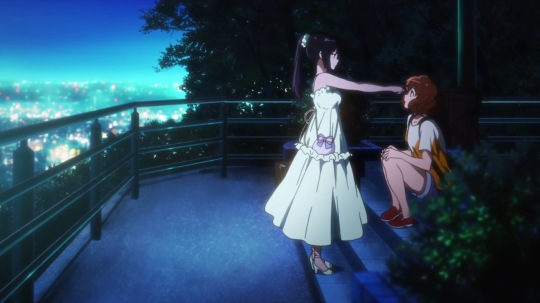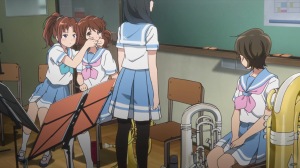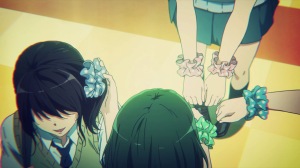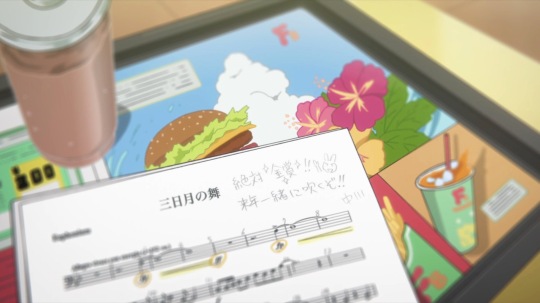On Sound! Euphonium and the ‘shipping’ debacle
June 14, 2015 25 Comments
 |
|
| Yes, it was romantic. But can we please move on? | |
Despite it being the series I am probably most engaged with at present, I dropped out of the Sound! Euphonium discussion on AS this week. My disillusionment with the focus over there has been building for a couple of weeks, ever since the infamous episode 8 ‘date’, and I finally decided on Monday that I would indeed leave for good. Don’t get me wrong: I’m not dismissing how ‘romantic’ the scene itself was, nor the fact that the characters in question connect on a level that even they find difficult to put into words. In fact, given what was revealed in that date, I wouldn’t be surprised if these two did find themselves falling in love with each other one day, if their hearts took them down that path. What I’m disgruntled about isn’t the content of the scene itself, or even the changes I hear KyoAni has made, but rather the consequences of the way it turned into a debate about shipping and yuri-baiting. Let me explain.
‘Shipping’—which I define as focusing on arguments about why certain characters should end up in a romantic relationship—has long been a pet peeve of mine. When viewers decide that they’re most interested in who ends up with whom, I find that they tend to marginalise the underlying foundation of the relationships in question. And I’m not talking just about ‘yuri’ or ‘BL’ stories either; in fact, the most disruptive shipping I’ve personally encountered involve heterosexual triangles. Though funnily enough, of the two series that I remember most in terms of this peeve of mine, one had heterosexual relationships, and the other was about a relationship between two teenage boys. With Sound! Euphonium, I now have the full set!* (^_^)
* Let me discount relationships involving transgender people for the moment, please. I’ve only seen/read one such series, and I remember the discussion for that one being pretty good.
 |
 |
| I agree that they’re drawn to each other. My question is: why? | |
Basically, my argument is that the shipping focus amongst Sound! Euphonium viewers has had them missing what I find most interesting about the relationship between Kumiko and Reina: what draws them together. Admittedly, the focus on ‘how romantic’ their relationship is shouldn’t be particularly surprising, especially with the way that the anime creative staff at Kyoto Animation ramped up all the instances showing the emotional connection that they have with each other. But what, exactly, is this emotional connection based on?
I contend that the core of this connection lies in something that may not be immediately obvious, especially to Westerners: the strict norms and structures of Japanese society that are arguably the key to how ‘harmonious’ it is. Whilst most people are probably aware of some of these norms—such as the importance of hierarchy, and the way many decisions are made by consensus—it goes far deeper than this. Most of the Japanese people I’ve spoken to about this find these norms pretty oppressive—that’s why they don’t live in Japan. I only felt it occasionally when I was there, though when I look back, I think I can see other situations where I was unknowingly running into those walls myself. Now that I see those hidden norms and structures a bit more clearly, I understand a bit better why my Japanese friends here in Australia really don’t want to go back and work in Japan. But it’s difficult to describe exactly what it is that they find oppressive, because it’s a combination of a number of different things.
 |
 |
| Following their lead…giving way to them. That is what hierarchy demands. | |
For example, except perhaps in really serious sporting teams that are trying to get to the nationals, most organisations are hierarchical rather than meritocratic. This includes school clubs; which is why the expectation in Sound! Euphonium was that the older students should be the ones playing in the competition. The changes that Taki has brought to the club have helped showcase the conflict between the hierarchical tradition and ‘choosing the right people for the job’. He shook it up by making participation based on ability; making the trumpet solo a question of ability as well is an even bigger faux pas in that society.
The emphasis on hierarchy is so widely accepted in Japanese society that, whilst I don’t condone it, I fully understand Yuuko’s dissatisfaction with Reina playing the trumpet solo. Kaori has waited patiently for over two years, and worked hard to keep the band going when it was falling apart the previous year; this is her last chance to perform the solo. In that sense, you could say that her dedication has earned the right to play the solo. Reina has two more years in high school, so why could she not give way so that Kaori is rewarded for her effort? To those of us from societies that emphasise meritocracy, this might appear to be a weak argument: of course, the person best suited for a job should get it! However, that is most certainly not the case in Japan—talk to most people on the JET programme, and I guarantee you’ll find most lamenting how it seems to be impossible to fire tenured teachers with substandard skills. And this aspect of Japanese society is incredibly frustrating for those that want to strive for excellence.
 |
 |
| ‘I really want you to fulfil your dream!’ | |
Another example of the norms and structures in Japanese society can be summed up in the term that is used to criticise the people who find it difficult to relate to others in the ‘Japanese way’: KY. This acronym stands for “kūki yomenai,” which literally means “can’t read the mood/atmosphere.” What it points to is how Japanese people are expected to anticipate and read how others are feeling; for example, a wife should be able to understand how her husband is feeling just by knowing broadly what’s going on in his job and field of work, and by looking at his body language. It’s basically the opposite of the West, where we are encouraged to communicate how we feel so that we can clear up any misunderstandings. And based on being able to read the atmosphere, Japanese people are also meant to be well versed in the platitudes that people say in various social situations.
Sound! Euphonium’s main character, Kumiko, is actually a very good example of someone who might be considered slightly KY. She struggles with saying platitudes that she doesn’t mean, or doing the usual social things so as to maintain harmony. Instead, she tends to speak her mind, as she did with Reina at the end of the JHS band competition. Her awareness of this ‘flaw’ is arguably the main reason why that incident has remained on her mind. Kumiko’s also pretty bad at picking up on social cues compared to most of the other characters—e.g. she was surprised that the two second years were dating, and also didn’t pick up on Asuka’s bad mood (though Hazuki and Midori didn’t either, so I can’t really blame her for the latter). For her, the ‘public face’ that she is meant to maintain is something that she’s not really comfortable with. Even though she appears to want to get better at it–that’s why she got annoyed at Shuuichi for nonchalantly calling her ‘cynical’–it seems like she’s not that invested in it. Her real self is somewhat disinterested in what most other Japanese people care about, which makes her seem kind of ‘distant’, as Reina put it (ep.18 ~18:20).
 |
 |
| Always saying what she thinks: that’s Kumiko for you. | |
This brings me to a third example of norms and structures that some Japanese people find frustrating: what is expected in friendships between school-aged girls (and yes, this is gender and age-group specific, although it can extend to university and beyond). One thing you might notice in shows about high-school girls is that they tend to congregate in the restroom. This is because ‘going to the restroom together’ is a sign of being friends—in fact, girls often use it as an opportunity to gossip about boys, teachers, even other girls. This is not unique to Japan, as I confirmed recently when it somehow became the topic of discussion at a dinner event I was at, but it is quite noticeable. And it does not end there. Going to festivals together, hanging out over the summer break, getting matching accessories. These are all examples of what girls do “because we’re friends.” This is what Reina is referring to in episode 8 (~19:40), when she says: “Being relieved to know you’re the same as someone else is stupid. I don’t want to be like all those people who follow the norm just because that’s what is expected of them.”* There are numerous other examples I could raise, such is what is expected of men and women once they get to the working age, but I think you get the gist. What I shall emphasise is that there’s a set way that things are done in Japan, which is really difficult to go against.
* I think the official translation here of “perfect people” for 「当たり前に出来上がってる人」 is incorrect, as I’m fairly certain that Reina’s actually talking about what I’ve highlighted about the ‘norms’ of human interaction in Japanese society.
edit (2015-09-18): FFF used “Becoming a faceless member of the crowd is something I want to avoid,” which is nice and simple because it uses a familiar concept. However, I personally don’t think it quite captures what Reina’s getting at, because it’s not just about being ‘special’ (which is what Western viewers seem to have taken from it), but rather about not wanting to do what is expected of her. That’s why she gives the example of ‘Sometimes I just want to throw that all away and just get on a train and go somewhere.’ For those of us in Western countries, this kind of behaviour has become quite normal – that’s pretty much how I traveled when I was on exchange back in the day. But it’s just not something that a studious and serious teenaged Japanese girl like Reina does.
 |
 |
| ‘Yay! We match!’ | |
This is the basis of “those inexplicable feelings” that have drawn Reina and Kumiko together. They both feel something similar to what my friends feel about living in Japan: that there are ideas about human interaction that they themselves think are pointless and constrictive. Like my friends, they want to break out of those hidden constraints that Japanese people use to maintain social harmony. Reina clearly laid it out in episode 8, but besides agreeing with her then, Kumiko has expressed similar thoughts separately: earlier in the episode, she tells the rest of the bass section that she’s not the slightest bit interested in going to the festival. And then we have the obvious point of similarity: what is happening with the trumpet solo echoes what happened to Kumiko in junior high, when an upperclassman went off at her for ‘taking my spot’ in the band. Reina was at the same school, so perhaps knowing about this incident is the reason she felt that Kumiko would understand? Admittedly, Kumiko is less certain about whether it is okay to go against these norms—her experience in junior high left her in great trepidation of being compelled to compete against her upperclassmen. Thankfully, Reina and Natsuki have helped her start overcoming this fear, and I look forward to seeing the strides that Kumiko will hopefully take as a result of these developments.
 |
|
| Go for the gold! And let’s play together next year! |
|
In sum, this is my reaction to the shipping debacle that has dominated the Sound! Euphonium discussion over the last few weeks. To take a cue from Asuka, I honestly do not care. The future possibilities are interesting: I can see the ‘kindred spirit’ connection between Kumiko and Reina leading to an exclusive ‘eros-type’ relationship–to use the Greek term for that kind of love–and I think it would be fascinating to watch how they come to it as they both struggle to overcome the norms and structures I’ve highlighted. But I don’t actually want to talk about it before it happens, because to me, that ‘shipping’ lens has derailed and blocked discussion about what I’m far more interested in: what it is, exactly, that draws Kumiko and Reina to each other, and the social commentary inherent in it.
p.s. Here are some quick notes I took on episode 10… I couldn’t really work them into this piece, so they’ve ended up on my LJ instead.
Thanks for the write-up!
Regarding Kumiko’s non-conformist personality: it was clear to all viewers that she spoke her mind and had some “bite” to her remarks. And even if you didn’t notice, other characters let you know from time to time ^_^. That’s what made her appealing to me (also her hair!). It was refreshingly different from the way most female MCs are portrayed in anime. Simply put, she had some spunk and had a healthy dose of cynicism without being obnoxious. But what I didn’t realize was how disruptive this behavior is to Japanese societal norms. I’m somewhat aware of the cultural differences, but they sometimes they remain on the outskirts of my mind and I still need to be reminded of their significance from someone with more experience\knowledge.
Now to be perfectly honest, the depiction of Kumiko and Reina’s relationship in this show requires viewers to ignore pre-conceived ideas of romance (maybe these are the “templates” that you mentioned in a previous post). You really have to open your mind so that the lip-touching, eye-gazing, and red-string of fate visuals in promos can’t be interpreted to mean one-and only one thing. Otherwise scenes like episode 8 are 100% yuri-love. This is quite hard to do, especially when most of the anime people watch might not have such nuanced, subtle human interactions.
I have more to say, but this is my limit for now. I get exhausted when writing more than a 1 paragraph these days, LOL!
LikeLike
And thank you for commenting!
Hm…I’m not entirely sure I’d characterise what Kumiko says as ‘having bite’ — it really is that she just speaks her mind, giving ‘the truth as she sees it’ rather than trying to put up a facade in order to keep things harmonious. That’s probably why you don’t find her obnoxious, because she’s not trying to be that way; rather, it’s just the way she is. And yeah, Kumiko’s really a fish out of water in that society. (^_^;; )
Which is precisely my point. The thing is, however, I am not saying this just in regard to relationships between two girls or two guys. In fact, what I most want is for viewers to lose that restrictive ‘shipping lens’ when looking at heterosexual relationships, so that they will actually look at the complexities of those relationships rather than just focusing on superficial symbolism such as the whole ‘red string of fate’ thing. I’ve actually seen a similar motif used in a Japanese drama series that dealt with with some complex ‘more than friends, less than lovers’ relationships — Last Friends. I’m not sure if you’ve heard of it, but I thought it was a fantastic show when a friend and I were watching it on TV back in the day.
LikeLike
i actually love kumiko’s character, when i watch the show im like oo fwah fwah kyo ani kumiko is actually a nice person, but if u actually view her personality/ dialogue in a vacuum, reina is right, her personality is pretty awful, if u gave her a different look and the anime a different artstyle she would make for a pretty convincing mean girl
LikeLike
Haha XD
Yeah, I actually really like how Kumiko is so straightforward in saying whatever comes to her mind, but you can see all the problems it would cause with someone who doesn’t know her very well.
LikeLike
Well said.
Actually I find the pairing frenzy is quite bothersome. They solely focused on the so-called romantic scenes, while I am also convinced that KyoAni do it on purpose (look how hard they work on those ‘infamous’ scenes).
Living in East, I can confirm to you that such “common social sense” exist. To strive in the system, you have to play along. Compared to the vast majority, the ones who disagree are far too few and therefore once one found another of the kind, is like you FINALLY find someone who understands. Hence Reina’s interest to Kumiko and vice versa.
What left me with question mark is how well Kumiko stay unflinched with the Reina’s very physical approach. She is rather mesmerized with how bold Reina is when entering her personal space. Love or partner-in-rebellion, either way it is quite an unusual feature to stand your ground as firmly as Kumiko when someone suddenly gets THAT close.
The only thought that popped in my mind is Kumiko gets very emotional when Reina – who she admires for Reina’s determination to strive to be special despite the given social demand (while Kumiko herself once only choosed to try playing along) – is losing her way right in front of Kumiko, so Kumiko just can’t let it happen.
Anyway, given how teasy KyoAni is in this anime, I wouldn’t try to deny or pick any side of the love affairs. I am not really fond of their tricks, but I have to say ‘it works’. But set that controversy aside, this anime has been done very well on details and I’d say Sound! Euphonium is their best anime so far in terms of technical details.
LikeLiked by 1 person
“But set that controversy aside, this anime has been done very well on details and I’d say Sound! Euphonium is their best anime so far in terms of technical details.”
Oh, I have to respectfully disagree. 🙂 Now don’t get me wrong, this show is definitely drop-dead gorgeous. Easily one of their best. But Hyouka still takes the cake for me in amount of care and detail the studio put into visuals, like the school festival.
LikeLike
…hm…I can’t give my position in that debate without rewatching Hyouka first… Personally, I started paying attention when I watched Clannad and After Story, and to me, the latter in particular has a few scenes that still strike a chord with me today!
LikeLike
hyouka’s so good, i don’t know why the anime is so underrated! although have to say everytime i start to watch clannad i never finish because of the art style and the fact that nagisa is irritating
LikeLike
Yeah, well, KyoAni has really focused on making the scenes ‘romantic’. I sense, however, that many viewers are conflating a ‘romantic’ relationship with a sexual one. Something Joss Whedon said in an interview recently really strikes a chord with me: “I find strong bonds between men and women that aren’t sexual not only cool and useful, but very romantic in a broad sense.” Of course, the relationship he was talking about wasn’t as physical as Reina and Kumiko’s (though that’s mostly from Reina’s side)…however, there are Japanese people I know that are very much ‘hug’ people. And that’s with friends with whom they don’t have such a deep, emotional connection with. Dealing with this would be a whole other post, however… (^_^;; )
Agreed. Though I do think Kumiko flinches — it’s just that she’s basically accepted that that’s how Reina is, and in some ways, is adapting herself to her.
And yeah, my reading of episode 11 is basically that she recognises that Reina is really considering giving up the solo to Kaori, and she stops it, because Reina’s willingness and desire to go against tradition (despite all the heartfelt reasons for such a generous gesture in this one case) is precisely what Kumiko admires.
LikeLike
“Dealing with this would be a whole other post, however… (^_^;; )”
Hahah.. Yeah. There are lots of debates on this part, and I got your point on this matter even just from this one post. Though I would love to read another one if you decide to dig deeper.
Um, correction on my own choice of words.. to call Kumiko “stay unflinched” is unfair for Kurosawa Tomoyo’s brilliant voice acting on that particular scene. The flinch lies on Kumiko’s short and sharp inhale, yet another good detail.
She did flinch, a little.
LikeLike
We’ll see when I’ll be able to churn that one out. Probably after another 5000 words on this series, I’m guessing! (^_^;; )
LikeLike
I certainly agree that the show’s social commentary is far more interesting than the whole debate about which character will end up with whom, but I think there’s more to the debate than it being mere ‘shipping’.
What I am personally afraid of is that Reina’s and Kumiko’s relationship will turn out to be a case of ‘Class S’, or to paraphrase a reviewer from ANN, a type of romantic friendship between girls that is perceived as acceptable (as it is seen as nonsexual and temporary) and one that girls are supposed to grow out of at some point, so they can marry men like they are supposed to. If Sound! Euphonium does end up going down this road that would give it a homophobic flavour that I would not be able to forgive, no matter how brilliant their social commentary might be. Since I really love the series for its nuanced ways of depicting friendships, its eye for detail and the social commentary mentioned earlier (and with me many others) I can understand a lot of people getting really worked up about the series possibly heading in a direction that would ruin it for a lot of us.
LikeLike
To be honest, there was almost nothing but shipping between episodes 8 and 10. Even the discussion about Reina wanting “to be special” seemed to be set on the idea that ‘being special’ meant ‘being in a mutually exclusive eros-type relationship with another girl’. Only after Reina revealed to Kumiko that she likes Taki in the ‘love’ way did some viewers start discussing what’s actually driving their relationship.
Hm…I guess I can understand that fear, especially if you believe that Reina’s actions can only mean that she’s in love with Kumiko (and is thus basically hitting on her).
My issue with that kind of argument, however, is that it assumes that all ‘romantic’ relationships must lead to a mutually exclusive sexual relationship. I’ll quote the Joss Whedon comment here again: “I find strong bonds between men and women that aren’t sexual not only cool and useful, but very romantic in a broad sense.” I’m not saying that I would hate to see Kumiko and Reina in such a relationship — rather, what I’d hate to see is viewers dismissing the strong emotional bond they have as ‘unrealistic’ unless they end up in such a relationship. I think that Kumiko and Reina can continue to connect on that level whilst also having another deep emotional connection with someone else. Not to say that this has to happen, but why is it dismissed as a viable option? Who is it that dictates that people can only have one soulmate, and that they have to be in a sexual relationship for such an emotional connection to be valid? Earlier this year, I read an article about women with platonic but deeply emotional relationships, women who ‘just understood each other‘. And I’m not talking about historical women (and men) — I didn’t note down where it was, but the article was about modern, Western women. I’m not trying to shoot anyone down, but I really would like more people to ask themselves why they characterise ‘love’ into neat, exclusive little boxes.
LikeLike
Hmm.. I have been for years in one of those sort of ‘just understood each other’ relationships with my male best friend. Both of us are heterosexual and have always been very physical with each other, even going as far as taking baths together when both of us were still single. But the reason that kind of relationship is possible between us is because there is no sexual tension, just a deep platonic love. So I am definitely not dismissing it as an option.
But when I see Reina and Kumiko (this might be just my interpretation however) I do sense some sort of very strong physical attraction to each other and a certain sexual tension in addition to their love. This doesn’t mean that they have to end up in a mutual exclusive sexual relationship for it to be acknowledged, it’s just that I have seen it happen before that two female characters had such feelings for each other which then inexplicably disappeared as soon as a male love interest appeared and that is what I’m afraid of at this point. I don’t really care which direction they go into with these characters, as long as it makes sense given the development of their characters and personalities and doesn’t feel as they are forcing them to be ‘straight’ again.
LikeLike
Well, I personally don’t see the sexual tension in some of the scenes in question. For example, the hugging scene in episode 10: since I understand how extreme Reina’s feelings of frustration are, that scene was very much a “I need emotional support about this” thing to me. As for the other scenes, if there really was sexual tension in either of them, I’d have expected one of them to kiss the other. But even then, what would the kiss mean?? To me, the reason they can act in this way around each other is precisely because they’re not interested in each other in that way (yet, if you wish). We may just have to agree to disagree on that.
And as for the fear that the relationship would disappear into nothing if they found a straight love interest: guaranteed not to happen for Reina, since she’s behaving in this way even though she loves Taki (so she says). As for Kumiko, why don’t we just finish watching the show first? If you want my opinion, the foundation of the bond between them is so unique–no one else close to them has those feelings of “wanting to be different from the norm”–that I don’t see the connection disappearing. To me as well, Kumiko mainly reacts to how emotional Reina is being, so I think it’s all driven by Reina, to be honest.
LikeLike
I know you are concerned about the shipping debate between the yuri side and the hetero side of Kumiko which both can find support in the novel. The larger question which sides agreed with was a mistrust of Kyoto Animation. I never heard the word yuribaiting before, but among the hundreds of responders to Random Curiosity and Wrong Every Time it was the dominant theme not shipping per say. Apparently, Kyoto Animation has a bad reputation among fans for yuribaiting. Most of commenters I read were afraid to say anything about what was going on between Kumiko and Reina because they feared that in the end Kyoto Animation would go in a completely different direction and they would feel used by Kyoto Animation.
Do you think that the rampant fear about Kyoto Animation’s motivation in using KumikoxReina is justified?
LikeLike
Hm…well, I would say that I’m concerned about both. Or rather, I’m concerned about the focus on both, because that focus has blocked discussion about what their relationship is about.
Basically, this is what I’m saying: “We heard you the first time, and even the second and third times. Do you really need to repeat the same thing 10 times or more? Just get over it and talk about some of the other more important things going on, will you?!”
Is how KyoAni is presenting thus justified? To be honest, I don’t know. I haven’t read the novels properly, so I don’t know enough about what has been changed, cut or added. KyoAni might indeed be upping the yuri hints in the relationship between Kumiko and Reina, or it might be trying to represent what was in the novel in the first place: a deep and emotional relationship between two girls who’ve found someone else that really understands how they feel.
But I also think part of the problem arises from how viewers seem to automatically read things according to tropes. As I’ve mentioned in some of my other replies so far, why does a ‘romantic’ and deeply emotional relationship automatically have to become a sexual one? I personally look at Reina and I see NOTHING that fits with her wanting an ‘éros’ relationship with Kumiko, nor a simple ‘philia’-type relationship, to use some of the Greek words for love. She behaves in a very intimate way, but that’s unusual for a girl her age no matter how I look at it. That’s why I want to go beyond vague words like “romantic” to examine exactly what they’re bonding over, and also why I avoid getting pulled into the KyoAni like ‘yuri-baiting’ debate.
LikeLike
I love KyoAni’s works.
But to be honest, I found this Yuri-baiting rather concerning.
Before Sound! Euphonium, I was convinced that they use the bait as teases, light jokes, etc but never as blatant as this series. The ‘blatant’ part is highlighted when I found out that even the Voice Actresses were as surprised (and awestruck?) as the rest of us when they watched the show. But on the other hand, I found this trick rather successful in attracting attention as the social commentaries were among the hottest anime topic around lately.
The only part that bothers me about this series is this “uneasy” feeling of where this goes from now on. Uneasy yet thrilling at the same time. Uhhh… Can’t describe it very well, I feel like I am on a jet coaster or something when I am watching the show.
LikeLike
You know, I’ve seen a fair number of KyoAni shows (the Full Metal Panic series, Air, Haruhi, Kanon, CLANNAD and After Story, Hyouka, Kyoukai no Kanata, Amagi Brilliant Park and now Eupho), and this is literally the first one where I’ve seen what everyone is calling “yuri-bating.”
Is it just that I’ve avoided all the shows where they do that?
Also, where are you hearing that the voice actresses were also surprised? (I mean, I think I’ve heard them on the radio show, but I haven’t actually watched those properly yet, so I’m just wondering where people are discussing all that…)
What are you uneasy about?
To be honest, I guess that what I don’t understand is why everyone is so up in arms over the “yuri-baiting.” Maybe it’s because I’ve seen the opposite (yaoi-baiting) in so many series over the years that I’ve learned to just ignore it? Or maybe it’s because I did actually know Japanese students who had pretty close, almost intimate friendships (not that I actually saw them in more private moments which is what the Reina-Kumiko moments have all been)? And I’m not talking just about the girls, btw: boys too, though always in a mucking around manner. I remember some very specific ‘OMG! did I just see that!’ things that we used to talk about when all of us foreign teachers met up outside of work. I remember ‘boys in each other’s laps in the classroom’ was one specifically mentioned. One of my friends even came across a couple of boys whom she is convinced were kissing at school (dunno whether they were just experimenting, or actually dating). That last one may be really unusual, but I’d expect that the boys in each others’ laps in the classroom thing happens at every single school – you’d just have to be there during the breaks to catch it. So I’m just not entirely sure I get the huge fuss that everyone is making over this…
edit: did a search on a whim, and well, what do you know…
And guess what? Happens in Korea too ^^
LikeLike
“You know, I’ve seen a fair number of KyoAni shows (the Full Metal Panic series, Air, Haruhi, Kanon, CLANNAD and After Story, Hyouka, Kyoukai no Kanata, Amagi Brilliant Park and now Eupho), and this is literally the first one where I’ve seen what everyone is calling “yuri-bating.”
Is it just that I’ve avoided all the shows where they do that?”
I guess so, too. This is the first one also for me. I think the closest one with the so called “Yuri-baiting” series was K-ON since they are all girls with pairings, but K-ON is NOWHERE close to Sound! Euphonium in terms of tension.
“Also, where are you hearing that the voice actresses were also surprised? (I mean, I think I’ve heard them on the radio show, but I haven’t actually watched those properly yet, so I’m just wondering where people are discussing all that…)”
I heard them on the radio show also. Reina’s CV was clearly surprised with the scene, so were the other three. But I think she agrees that’s just the way Reina is, stoic and “my pace” kind of person. My Japanese could just barely grasp the main point of their topic though.
“What are you uneasy about?”
Hm… it’s for a subjective reason I guess. Probably because in where I live, yuri and Yaoi words are very sensitive and considered vulgar, definitely more strict than in Japan. I love how well made this anime is, but being so loud about loving the anime both in real life or in the internet isn’t really a good idea – because of the image given to the anime thanks to the romantic scenes and most of the reactions regarding to that.
Social demand, that sort of thing.
Especially when people who barely pay attention to Sound! Euphonium’s detail refer to the Yuri-baiting as KyoAni’s best bet to win the audience. As a KyoAni fan, I found it really cheapens the value of the anime. Maybe I am just thinking too much, but I feel uneasy nonetheless.
That said, I still defend Kumiko though. I can understand most of her reason and moves. I agree with you about her accepting Reina the way Reina is. I am pretty optimistic that “Confession of Love” is their own language that means getting on each others back, understand and support each others ideal, but not the intimate one. Maybe all these trivial things make watching (and rooting for) Sound! Euphonium is more like a jet coaster ride for me. I want to stick until the end of the ride, though.
“did a search on a whim, and well, what do you know…
And guess what? Happens in Korea too ^^”
you’ve done your research. Funnily enough, sitting together in one corner, sharing a single pillow, grabing one’s hair with odd fingers, holding hands and squeezing when shaking hands are also pretty common sight here.
Additional:
I think Reina’s skinship to Kumiko is like teasing around the threshold though – hence the split reaction among the audience.
LikeLike
Yeah, well, K-ON! was very much one of those ‘cute girls doing cute things’ series that I tend to avoid like the plague. ^^;
Ah…I really should catch up on those. My head is in a bit of a spin about the format, though, because there are two types of programs — one an actual radio show (where they don’t actually seem to talk much about the recent episode!) and one that’s a video show, where they talk a lot about the episode! But the latter are only released every two weeks! Which of them are you listening to? (Or is it both?)
Hm…I’m not sure I know a country where the words yuri and yaoi are readily accepted. It’s very much a niche thing even in Japan – like, you just DO NOT talk about it with people who are not in the subculture themselves… (and GLBT rights there are quite backward compared to many other developed countries)…
I’ve leave my judgment on what KyoAni did with Sound! Euphonium for until I’ve had the chance to read the novels for myself. I do have an idea based on the bits and pieces I’ve skimmed, but there’s been so much changed and rearranged that I’ll have to read the whole thing to get the full effect of the differences.
The only thing I regret is not looking it up when I was still posting on AS! Even though I knew from personal experience that it does happen!
I know it happens in a lot of Asian and South East Asian countries…so perhaps you’re from SEA? (though you don’t have to answer if you’d rather not ^^)
Agreed. I think they’ve gone a little too far with some of the changes, though admittedly, I differ slightly from another poster on AS with regards to the level of ‘yuri-baiting’ itself.
LikeLike
Pingback: Hibike! Euphonium (2015): Final Thoughts with Spoilers | Pirates of the Burley Griffin
Pingback: Sound! Euphonium and the pros and cons of collectivism | HOT CHOCOLATE IN A BOWL
Pingback: Sound! Euphonium: media consumption and the ‘romance lens’ | HOT CHOCOLATE IN A BOWL
Pingback: Moments of 2015: The Sounds of Youth, Dreams and Expectations | HOT CHOCOLATE IN A BOWL